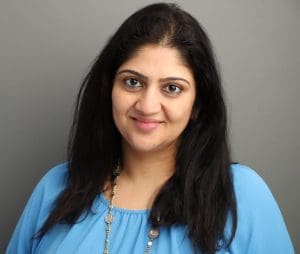 If you ask Maduri Asokan about her professional goals, she will tell you about her passion for technology, product design and building inclusive and user-centric financial service products, with the overarching objective of re-imagining how customer needs are addressed within the financial services industry.
If you ask Maduri Asokan about her professional goals, she will tell you about her passion for technology, product design and building inclusive and user-centric financial service products, with the overarching objective of re-imagining how customer needs are addressed within the financial services industry.
As an executive director at JPMorgan Chase in New York, she is well on her way to doing that. Her past and present colleagues will tell you the same. A review of her LinkedIn profile shows glowing reviews from people who know her work ethic:
“Diligent, tenacious and professional in all of her work.”
“A gem that’s hard to come by these days.”
“A strong business and technology consultant.”
“An enthusiastic and hard working team player.”
“An exceptional asset to the firm.”
“Nothing below exceptional.”
At JPMorgan Chase, Asokan serves as the area product owner for co-brand credit card rewards, travel and loyalty programs. A proud alumna of Syracuse University’s School of Information Studies, she lives in Short Hills, N.J., with her husband, 7-year-old daughter and a puppy.
“JPMC has over 30 million co-brand credit card users, and it’s very exciting to have the opportunity to design products and services influencing millions of customers,” said Asokan, who graduated with her master’s degree in information management in 2008.
Co-brand cards are issued by financial institutions in partnership with a company, organization or brand. In her role, Asokan is focused on product growth, consumer loyalty, branding and financial technology.
“This role gives me the opportunity to make a significant impact on JPMC’s card product strategy and working on cutting-edge technologies and ideas, driving the development of new products and features that can disrupt industries and improve people’s lives,” she said.
She remembers one product management job in particular where she was able to develop peer-to-peer payment systems, a pivotal project that allowed her to work with a chief product officer. That job changed the course of her career and how she approached building products.
“This experience taught me invaluable lessons, most notably the importance of visionary leadership in understanding the evolving landscape of customer preferences and the capacity to delight users,” she said. “I discovered the art of mentorship through this collaboration, underlining the significance of a user-centric approach and the importance of adaptability in a swiftly changing industry like fintech.”
In early 2015, while working for Ernst and Young, Asokan helped build a mobile app for Citibank’s ultra-high networth customers. After that, she worked with other large financial institutions, including HSBC and Morgan Stanley, before moving to the startup world for a few years.
“That gave me all-around exposure with my role evolving across strategy, operations and implementation,” she said. “I found the sense of ownership, continuous learning, problem solving and ability to influence change and impact very exciting and aligned with my personal and professional goals.”
Longterm, she hopes to transition into an operator role providing strategic guidance and leveraging her product expertise to contribute to the growth and success of portfolio companies.
“I envision myself collaborating closely with these ventures, playing a pivotal role in defining their product direction, and ultimately contributing to their overall success in the competitive market,” Asokan said. “This path combines my passion for product development and strategic leadership, and it’s where I see myself making a meaningful impact in the years ahead.”
If she could give advice to Syracuse students hoping to have a similarly successful career, Asokan would encourage them to take advantage of the resources the university provides.
“Leverage your professors’ industry networks and connect with alumni. Host and participate in seminars with industry leaders to keep a pulse of the skills needed today,” she said. “If you are interested in the product space, be entrepreneurial and participate in hackathons, pitch competitions, etc. through incubators, accelerators and funding for student startups that SU supports. This will give you good insights into real-world working styles.”
